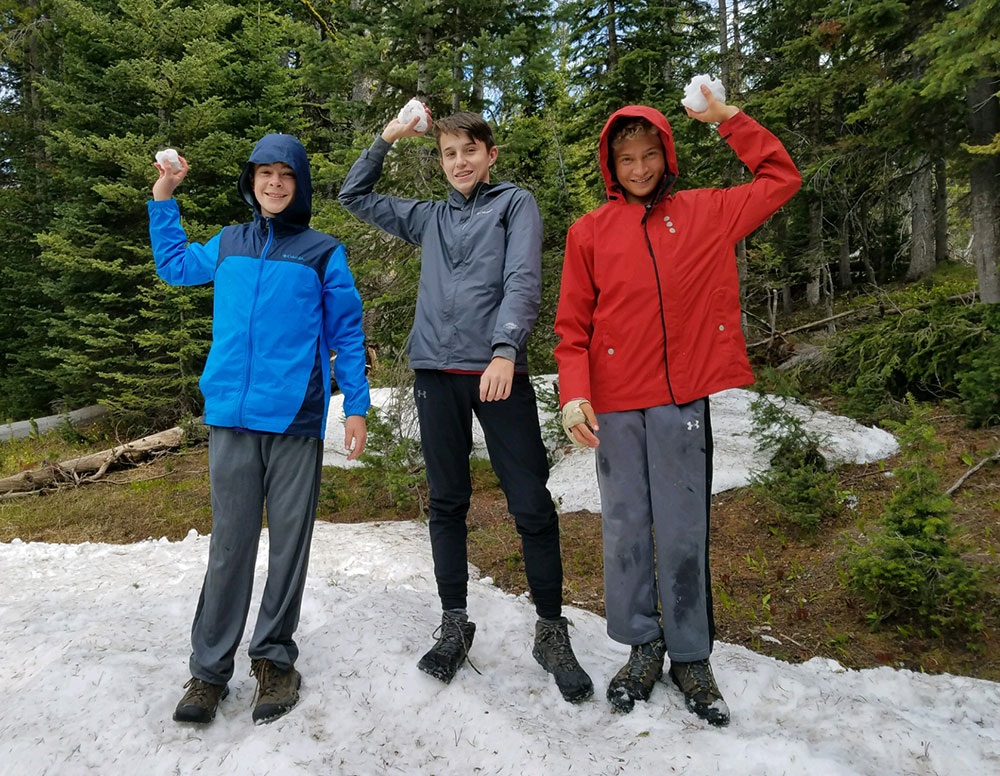Nice Kids Finish First
 We often hear students say after arriving home from Adventure Treks, “Everyone is so nice at AT… why can’t it be like that in the real world?!” Of course, we’re thrilled to hear the feedback, because it means we’re doing our jobs in providing the close, inclusive communities we promise to everyone. The culture of kindness is a key part of our program design, and the cornerstone of the community we’ve been building for 27 years.
We often hear students say after arriving home from Adventure Treks, “Everyone is so nice at AT… why can’t it be like that in the real world?!” Of course, we’re thrilled to hear the feedback, because it means we’re doing our jobs in providing the close, inclusive communities we promise to everyone. The culture of kindness is a key part of our program design, and the cornerstone of the community we’ve been building for 27 years.
Everything we do at Adventure Treks emanates from a place of kindness and respect. But being kind is more than just a good way to live; research shows that kids who are nice actually finish first, in that they become more successful adults.
 A 2015 study by Damon Jones, a senior research associate at the Bennett Pierce Prevention Research Center, tracked kindergarteners’ success over 20 years in four major U.S. cities based on the prosocial skills they exhibited in kindergarten. It found that children who demonstrate more “pro-social” skills—those who share more, demonstrate more empathy, and who are better listeners—are more likely to have good jobs and stay out of trouble as young adults. Furthermore, generous people have higher incomes and get better performance reviews than those who are less generous.
A 2015 study by Damon Jones, a senior research associate at the Bennett Pierce Prevention Research Center, tracked kindergarteners’ success over 20 years in four major U.S. cities based on the prosocial skills they exhibited in kindergarten. It found that children who demonstrate more “pro-social” skills—those who share more, demonstrate more empathy, and who are better listeners—are more likely to have good jobs and stay out of trouble as young adults. Furthermore, generous people have higher incomes and get better performance reviews than those who are less generous.
Concern for others also promotes supportive relationships and reduces the chance of depression. Students who care about others tend to see their education as preparation for contributing to society rather than making money, an outlook which encourages them to persevere even when studies seem dull.
These pro-social characteristics (empathy, cooperation, perseverance, and self-control) are malleable skills that can be taught. While we naturally attract nice kids at Adventure Treks, it’s nice to know that our environment and culture can actually help already nice kids improve these social skills, continuing to help set them up for success.
Our emphasis on kindness is important because data shows kindness is in decline in the U.S. (though not in Canada). This matches a long-term decline in empathy, community affiliation, group membership, and use of words like “love,” “gentleness,” “kindness,” and “goodness” in modern discourse. Use of these words have declined 50 percent in the modern age as have conversations about purpose and morality (Journal of Positive Psychology, 2012).

Some of this decline in kindness may be an unintentional change in our parenting styles as a result of trying to prepare our children for participation in a competitive global economy. From a December 2019 Atlantic article about the Making Caring Common Project: “If you survey American parents about what they want for their kids, more than 90 percent say one of their top priorities is that their children be caring. This makes sense: Kindness and concern for others are held as moral virtues in nearly every society and religion. But when you ask children what their parents want for them, 81 percent say their parents value achievement and happiness over caring…
“Kids, with their sensitive antennae, pick up on all this. They see their peers being celebrated primarily for the grades they get and the goals they score, not for the generosity they show. They see adults marking their achievements without paying as much attention to their character.”
Annual surveys of American college students also show a substantial drop from 1979 to the present in empathy and in imagining the perspectives of others. Over this period, students grew less likely to feel concern for people less fortunate than themselves—and less bothered by seeing others treated unfairly.
As parents, we know that if we want kindness to be a key value, we must give it support. The Road to Character author Dave Brooks talks about two sets of virtues: résumé virtues and eulogy virtues. In life, the skills we need for the job market, the attributes “essential” for our external and financial success, are often at odds with the virtues that we hope others would attribute to us at our funeral.
 These are the elements of our character, our virtues—the relationships we maintain, our kindness, humility, gratitude, sacrifice, concern for others, morality, integrity, responsibility, and resilience.
These are the elements of our character, our virtues—the relationships we maintain, our kindness, humility, gratitude, sacrifice, concern for others, morality, integrity, responsibility, and resilience.
When kids are praised for helping others, they are more likely to continue this behavior. Teaching children to care for others helps them live a more fulfilling life. This is what we do at Adventure Treks! Every day during evening meeting, we make space to praise people who helped others out. We create numerous opportunities to volunteer and make sure good deeds are noticed, appreciated, and praised. Kindness is contagious. Our culture builds on itself, and in an outdoor community, the competition changes from who can achieve the most to who can be the nicest kid!
Besides the fulfillment AT kids get from being a contributing part of a close, caring, and kind community, it’s great to know that they are building skills that will help them finish first!

